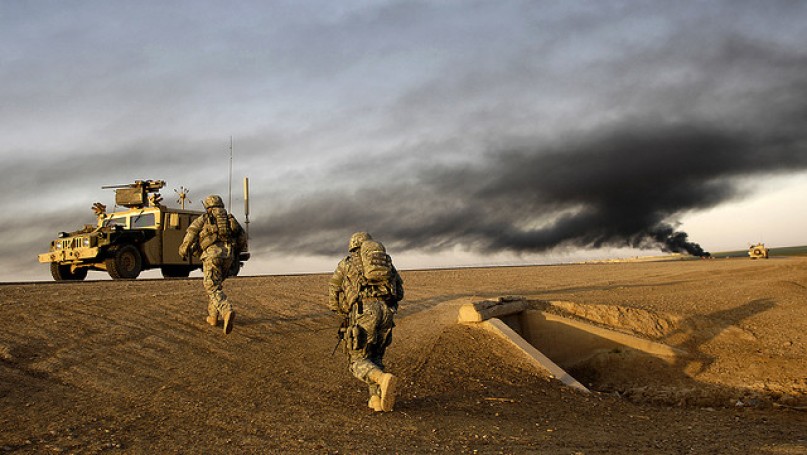
The current crisis in Iraq has many alarming implications for our security. One of them appears to be the revival of the idea of “War on Terror.” This concept is extremely vague and arguably worthless. Hence, we need to debunk it in order to have a better understanding of what is happening in the Middle East, what our leaders are doing, and what we should expect them to do.
Terrorism is a criminal, heinous, coward, and intolerable practice. It targets unarmed and harmless people with the deliberate objective of inducing terror. Furthermore, it violates virtually all international norms and conventions intended to regulate the use of force. Terrorism, however, is not an ideology or a political project. Rather, it is a way of using violence in order to advance a political objective – it is, in other words, a particular kind of warfare, like guerrilla, naval warfare, trench warfare, or air warfare, just to name a few. Under certain conditions, military strategists may opt for a naval campaign or, alternatively, for an air campaign. From a political point of view, however, waging a “war on naval warfare,” or a “war on air warfare,” doesn’t make sense. Similarly, terrorism must be opposed by resorting to several instruments of policy, including military force. Political leaders declaring a “War on Terror,” however, are declaring something that is grossly, and dangerously, meaningless.
Let’s try to see the issue from another perspective. Nazism, fascism, and communism are ideologies that advance brutal totalitarian political projects incompatible with fundamental human rights. Liberal and socialist doctrines, on the other hand, promote political projects that can be articulated in a number of more or less popular and successful varieties, but are in general compatible with democratic institutions and human rights. The states – and the men and women – that fought and defeated Nazi-fascism during the Second World War were fighting totalitarian political projects, not ways of warfare. Those states – and the men and women – that opposed Soviet communism during the Cold War, were not simply deterring Soviet advances through nuclear and conventional arsenals, they were also promoting an alternative vision of politics and society. In all these episodes, victory was not merely about military outcomes. It was about the advancement of specific political projects informed by liberal and socialist doctrines, compatible with democratic principles and human rights.
Although it doesn’t belong to the family of Western political thought, Islamism too is a political project – we may dare to call it an ideology – which can be articulated in a number of different varieties and enjoy different degrees of popularity in those countries where Islam occupies a prominent role in society. Some forms of Islamism are peaceful and can arguably fit into democratic institutions. Others – the ones we are most exposed to through the media – can degenerate into extremist, intolerant, and violent endeavors which represent an affront to the universal values of human dignity – as it is the case with any extremist ideology on record.
The United States and its Western allies are currently engaged – more or less directly – in a military intervention in Iraq, which may soon be expanded to Syria. This must definitely not become a “War on Terror Redux.” A war on terror will never be won because, as we have seen, it is a war that doesn’t make sense. Rather, America and its allies must intervene militarily against extremist and aggression-prone Islamic militant groups. For such a military intervention to succeed, they must not only understand what kind of political project they are opposing, but also decide what vision of politics and society they want to see prevail.
The only way to achieve victory and peace at a reasonable price is to work out a political solution that is deemed acceptable not only by the US and its closest allies, but also by other non-Western countries that are more or less keen to cooperate with Washington and the West, as well as by other great powers that have a stake in the conflict or are threatened by this kind of extremism. Last but not least, such a political solution must fulfill the preferences and the expectations of the people who are now victim of violence and extremism in the region. This effort requires much more than military power. It requires commitment, sacrifices, and compromises. Any conceptual shortcut may result into faulty policies and, ultimately, into tragic and unjustified losses of blood and treasure.
In this world, we are often confronted with challenges to our core values and threats to our security and well-being. Sometimes these challenges and threats must be dealt with by resorting to military force. War, however, even when it is morally and legally justified, is a tragic and painful event. When civilized nations debate whether to resort to war or how to wage it, shallow and ill-defined concepts must not set the terms of the debate.
Further Reading on E-International Relations
- Cold War Theories, War on Terror Practices
- International Relations Theory and the ‘Islamic State’
- Arab Contributions to Islamic International Relations: Why is There No Breakthrough in Theorizing?
- ‘Eastern Ukraine’ is No More: War and Identity in Post-Euromaidan Dnipropetrovsk
- The PNAC (1997–2006) and the Post-Cold War ‘Neoconservative Moment’
- 5 Reasons Why the West Got Islamist Terrorism Wrong
